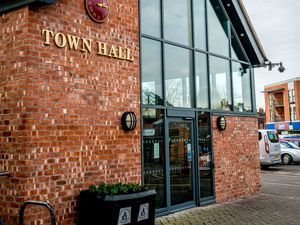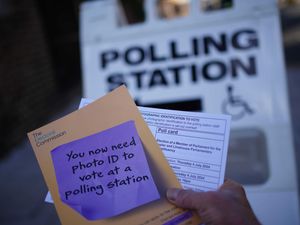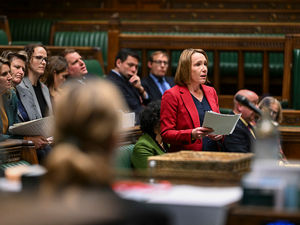It's all around the Wrekin for candidates
It's day two of our tour of our region's constituencies. Thom Kennedy visits the fight around the Wrekin.
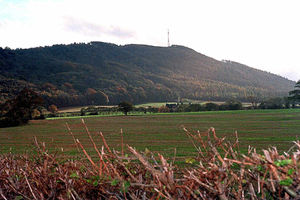
Never in history have the main parties in English politics found themselves fighting on so many fronts. Wales, Scotland and Northern Ireland have long supported parties specific to their own countries, but the unprecedented support for Ukip presents a new challenge in England.
Polling by Tory peer Lord Ashcroft suggests Ukip's support currently stands at around 10 per cent, although it has drifted from 15 per cent in the last year.
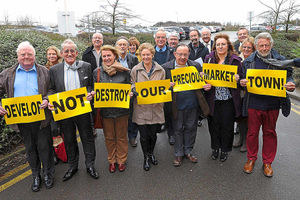
Supermarkets are enough to give anyone a headache. It is normally something families doing their weekly shopping need to worry about.
But for the next Wrekin MP, the issue of supermarkets, as well as the wider issue of development will be a key battleground.
During the last five years, campaign groups have sprung up across the constituency – most notably in Newport, Lilleshall, Muxton and Edgmond. All have similar beliefs, and all have managed to garner the support of the previous MP Mark Pritchard – as well as several of his political opponents including Ukip candidate for the seat Jill Seymour.
They all believe they are losing precious green space in their villages and around Newport, and all make the argument that there are more suitable brownfield sites to build on.
The next MP for The Wrekin will have to represent those campaigners' arguments in Parliament and persuade the Government to encourage firms and local authorities to build on brownfield sites.
Perhaps the most prominent campaign has been the issue of supermarkets in Newport – a battle which dominated the previous Parliamentary term and ended with calls from opposition councillors for the leader of Telford & Wrekin Council to step down.
And, despite the more than five years of wrangling, Newport still has nothing to show for the inquiries held and the money spent and the issue shows no sign of going away.
After a freedom of information request submitted by the Shropshire Star, the council admitted it had spent more than £1.35 million of taxpayers' money on supermarket plans in the town. It revealed the council, either as landowner or planning authority, spent £1,356,620 on applications for supermarkets at Mere Park, Audley Avenue and Station Road.
After the figures were revealed, it sparked a strong reaction from politicians on both sides of the aisle and campaigners alike. Mr Pritchard described it as a "fiasco" and said taxpayers would be "angry".
And David Parker, of the Save Newport Campaign, said: "I think they owe Newport one huge apology."
Authority leaders claimed money needed to be spent to "protect the public purse".
Councillor Kuldip Sahota, the council's leader, said
the opposition to the controversial Sainsbury's Station Road application – which was pulled last year – was "more political than practical and attempted to damage the finances of Telford & Wrekin".
But such is the disparate spread of the party's support around the country, that would lead to the party returning around four MPs to the commons – only two more than it purloined from rivals during the last parliament.
The Liberal Democrats, by comparison, poll at six per cent, its pockets of support around the country should help it send around 25 MPs to parliament – hardly the 62 it managed last time out, but giving it far more influence than Ukip.
We know Ukip won't win a majority – so what does a triumph in this election look like to the party's transport spokesman and would-be Wrekin MP Jill Seymour?
"A victory would be to have enough MPs in parliament to make a difference," she says as we meet at her constituency offices opposite the old Curzon cinema in Wellington. "A successful campaign is winning, we have our targets, and those we will be focusing on."
She won't reveal which seats are the Ukip targets, but adds that the response on the doorstep has been "positive".
"People tell me they are detached from the other three parties because they don't believe them any more. Whether that resonates into votes, we'll see on May 7."
The longest odds on Ukip landing the seat this time out are a relatively modest 14/1 with Paddy Power, but the same bookies has Conservative candidate Mark Pritchard almost nailed on for victory at 1/25.
Still, 44 per cent of bets in the constituency have been lumped on Ukip, with the Labour party enjoying the same backing. Only 11 per cent have staked cash on the Tories winning because of the measly odds.
Lib dem candidate Rod Keyes and Green nominee Cath Edwards must both overturn odds of around 100/1 if they are to land the seat.
Despite odds of 16/1 suggesting Labour are facing a fight for second place, candidate Katrina Gilman insists the seat, which has veered between the two major parties, remains a straight red-blue shoot-out.
"I think it will be incredibly close," says the 37-year-old, who works in the criminal justice system and lives just off the patch in Brookside in Telford.
"From conversations I have had since selection in November 2013, I think it will be closely fought between us and the Conservatives, and every vote will make a difference.
"We are much closer to where we were in 2005 than 2010. The reality is it was an odd election result for the constituency, and that is being used by the bookies to look at people's chances.
"I think Ukip will be the third contender. The polling nationally and the attitudes at the door since the European election suggest that lots are coming away from Ukip."
The current incumbent is Mark Pritchard, the Herefordshire-raised 48-year-old who has held onto the Wrekin since 2005.
His majority at the last count was the biggest the constituency had ever known, and 10 times higher than the 942 when he was first elected.
"There's a straight choice both locally and nationally," he says. "It's going to be David Cameron or Ed Miliband in Downing Street, and a vote for Ukip is going to allow Ed Miliband in through the back door, and all that would mean would be the economy going in the wrong direction and higher taxes."
Ms Gilman is campaigning on the issues of employment and wages, and is hopeful despite the seat not featuring on the party's list of 106 key targets around the country.
"Five or six years ago people were doing a job with relatively good money," she said. "They might be employed but have lost a lot of income. Increasing the minimum wage will certainly make a difference to many people, and the jobs guarantee will make a difference to young people."
That scheme will see young people who are out of work offered a publicly-funded job, with benefit sanctions for those who refuse the work.
She also says that she has heard negative comments on the doorstep about her Tory rival's visibility as a local MP, as well as his business interests outside parliament, but Mr Pritchard added: "She's not going to say 'people think he is a great MP', is she?
Disengagement from politics and politicians was a common theme, especially amongst younger people. Santa Shidobskaya, 16, a student from Arleston, said: "Some kids don't have their own opinion. I don't think they actually care."
But Bradley Manville, 19, who lives in Wellington and works in Staples, said: "It's all down to the parties actually getting involved. You never really see politicians about in Wellington".
Bradley's mum Lynn, 53, agreed that MPs need to spend more time getting to know their constituents.
"You need someone speaking for you, where you are," she said. "At the moment the apathy round here is awful."
Lynn is struggling to find work, and thinks that the Government needs to do more to provide jobs, and provide more loans for the owners of small businesses.
Natalie Bodley, a 27-year-old housewife from Stirchley, said: "The biggest issue for me is reform of benefits. At the moment it's unfair to those who genuinely need it."
Natalie, who will be voting for Labour, added: "They seem fair when it comes down to it, but they'll make cuts if they have to as well."
The NHS was described as another key issue by many voters. Nigel Handley, 67, from Shawbirch, said: "I spent 18 months in hospital when I was younger, and you can really see the difference. There are no matrons any more."
His wife Joan, thinks that politicians should do more to engage with people.
"We have delivered Harper Adams as a university, RAF Cosford was under threat of being mothballed and now it's receiving investment, MOD Donnington has been awarded the largest defence contract in 25 years. People want an MP that's going to represent the Wrekin to parliament rather than the other way round, and that's why I was delivered with the largest majority in the seat's history in 2010.
"I'm not a typical Conservative, I went to a comprehensive school, was state educated, I have two masters which I paid for over my holidays during nine years, and I started my own business. My life is one of social mobility, and I have the poorest background of any candidate standing in the West Midlands, but have made a success out of working hard and doing the right things."
Summarising his policies in this campaign, he says locating a new unified A&E in Telford, supporting the local economy, and encouraging inward investment to bolster the local manufacturing sector will be the leading policies he faces. Ukip's campaign office – which attracted controversy as it is rented from Mrs Seymour's husband using European money – is dotted with cartoons of party leader Nigel Farage making a mockery of his election rivals.
The party's would-be MP has three books on the corner of her desk – two about Ukip, including Farage's recent tome about the last year of campaigning, and one about the history of the Wrekin. The dedication to the party's figurehead is clear.
Did Mrs Seymour have any previous political leanings before joining Ukip back in 2001, I wonder.
"It's so far back I can't remember," she replies, unconvincingly. "Probably once or twice I voted for the Conservatives, but I didn't really think politics had any part in my life. That was 14 years ago, I've learned a lot since then.
"I believe the party talks more from the heart rather than feeling they are above it.
"We had life before the EU, and a good trading relationship. We had people who believed when they had a job it was for life, or they could rise from an apprentice to get up the ladder. That used to be the ethos."
One thing that has consistently dogged Ukip is suggestions of racism within the party, I say, pointing to a recent parliamentary candidate, dismissed after some shocking comments in a television interview.
Mrs Seymour bristles with annoyance at suggestions of racism in the party.
"I'm extremely offended that people feel that," she rages, jabbing the steering wheel of her Audi as we head out to a meeting with residents in Muxton.
"When I joined Ukip we didn't have a multi-cultural mixture of individuals and weren't so diverse. Now at least 17 per cent of candidates are from different backgrounds. I tend to feel it's other parties scaremongering the public in saying we are that way.
"We've had individuals that alarmed me. We were never good at dealing with it, but now we are a lot stronger. We react instantly and will remove them until they can prove the other way.
"I would walk away from Ukip if I thought it was racist, negative bigotry I find offensive and I would walk away from the party if that was the case."
Where does she think that the BNP's support from the last election has gone, though?
Keep up with all the Shropshire and Mid Wales election news at www.shropshirestar.com/election
The BNP mustered more than 500,000 votes in 2010 – is it not possible that some of its more unsavoury support has shifted into the Ukip ranks?
"I hope the BNP has been demolished, removed, I think it's disgusting," she splutters. "I think their voters have seen that the world is modernising and needs to be more tolerant.
"I remember at the Telford conference we had two car loads of BNP people frightening the life out of Ukip members. I thought, these aren't nice people, these are thugs, we must remove it."
On her party's immigration policy, she says: "Many that come here are seeking help financially. Most people from all walks of life from other countries, have been here and contributed, and earned that right. We need a system where those that come here can afford their medical insurance.
"We are a caring nation, have always been generous, we're not going to turn our backs on people like that. This country has to be able to sustain itself, we need to be able to do a points-based system where skilled people can contribute to the services they require.
"I was brought up to put others before myself. If somebody needs my help that's fine. I don't want to see people from other walks of the EU sleeping behind brick wall or going to foodbanks. But we've also got that among people from the UK."
She's less emphatic when asked about the party's policies on the economy, in particular about the London-based banking sector.
"You're talking about the economy, which is a strong thing. I'm a woman, I spend my money, I'm not very good with figures when it comes to my pocket money," she responds.
"We have the banks that are being addressed at the moment, but that's not something I'm focused on, I'm focused on this community and what they want from me, not somebody in London."
As well as her constituency role, she leads the party on transport, opposing the HS2 rail line – warning it could lead to capacity issues which mean sacrificing Shropshire's direct rail route to London.
She says she wants the condition of roads improving, along with parking around railway stations, and to stop the building of new dual carriageways without thorough consultation.
In Muxton, she meets a group of elderly residents at Breton Park who are worried out a large new housing development being built around their properties. Housing, she says, is another key policy matter, and she opposes a lot of large-scale building, as well as the bedroom tax.
"I've never heard a politician tell me where we stop building," she says. "Are we going to carry on the speed we are doing? There's no data about what's the maximum this country can have as a population. There's no figures about how many more schools we should be having, they are fighting fire on a regular basis.
"If you talk to communities they can tell you exactly what they want. There is a growth of property, but that's gone berserk. Where the public go to planning departments and say this is overloading our areas, but they understand there's a balance of new property."
Follow the campaign six days a week in the Shropshire Star newspaper, round the clock on at shropshirestar.com/election where we will carry breaking news and by signing up to our email newsletter.

